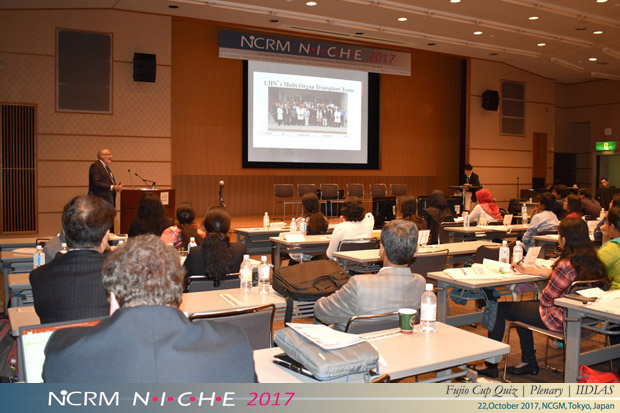| |
Tokyo, 31st October 2017: A cocktail of chemicals called small molecules can create liver progenitor cells in the lab to regenerate the disease affected liver which when translated clinically has huge potential in treating liver failure, was presented by Prof. Takahiro Ochiya, from the National Cancer Centre, Japan in the recently held International Stem Cells and Regenerative Medicine meet, the NCRM NICHE 2017 in Tokyo, Japan on the 22 & 23 October, 2017. This method, not using any oncogenes or viral vectors (Ref: Katsuda et al., Cell Stem Cell, 2017) was lauded as a much safer one by experts. Plenary lecture delivered by Prof. Jurgen Hescheler (University of Cologne, Germany) described about various types of stem cells and pluripotency and that by Prof. Gary Levy (University of Toronto, Canada) described about the use of autologous stem cells to restore tolerance in allo-and auto-immune disease.

The XII NCRM NICHE was held this year at the National Centre for Global health and Medicine (NCGM), Tokyo, Japan in academic partnership with Dept. of RM, NCGM, Tokyo, Japan; Dept. of Apl. Chem., Shibaura Institute of Technology, Tokyo, Japan; German Society for Stem Cell Research (GSZ), Cologne, Germany and the Training Program in Regenerative Medicine (TPRM), Canada. This event was held in India from 2006 until 2016, which, this year was held for the first time in Japan, attracted 150 delegates from 11 countries.

The finals of the Fujio Cup Quiz (FCQ), an integral part of NCRM NICHE 2017 saw teams from Egypt, Indonesia and India competing for the prestigious Fujio cup which was won by the team comprising of Mr. Anirudh Pai and Mr. Siddharth Shankar from Kasturba Medical College, Mangaluru, India. Ms. Noordeen Khalidha and Ms. Harur Muralidharan Nisha from Anna University, Chennai, India turned out to be the 1st Runner up among 24 teams from six countries who were selected by a two-step online test and a regenerative medicine based assignment among 50 teams from eight countries.

On the second day, the delegates were taken on an exclusive tour to the Tokyo Women's Medical University - Waseda University Joint Institution for Advanced Biomedical Sciences (TWIns) and the Edogawa Hospital, Tokyo, Japan where they interacted with experts working on cutting edge Regenerative Medicine applications. Scholars of engineering and non-medical faculty from Japan working towards solutions in healthcare presented their work apart from scholars from other countries working on Regenerative Medicine in the Interdisciplinary Conclave (IDC) which was conducted in the Shibaura Institute of Technology (SIT), Tokyo, Japan. The presentation by Mr. Nair Ashish Dinesh from SRM University, India was chosen as the Best Paper in the Regenerative Medicine Category. The presentation by Mr. Keiichi Kimura (University of Tokyo, Japan) and Ms. Risako Mori (Shibaura Institute of Technology, Japan) were chosen as the Best Papers in the Inter-disciplinary Medical Technologies Category. This event was unique because the Fujio Cup Quiz (FCQ) participants served as the Jury for selecting the best presentations. Rev. Fr. Peter Balleis SJ, Head of Jesuit Worldwide Learning (JWL), Geneva and Dr. Francis Xavier from Boston College, USA presented their work of educating the marginalized and perspectives of physics and chemistry in unravelling the mysteries of biology respectively, in the concluding session.

|





